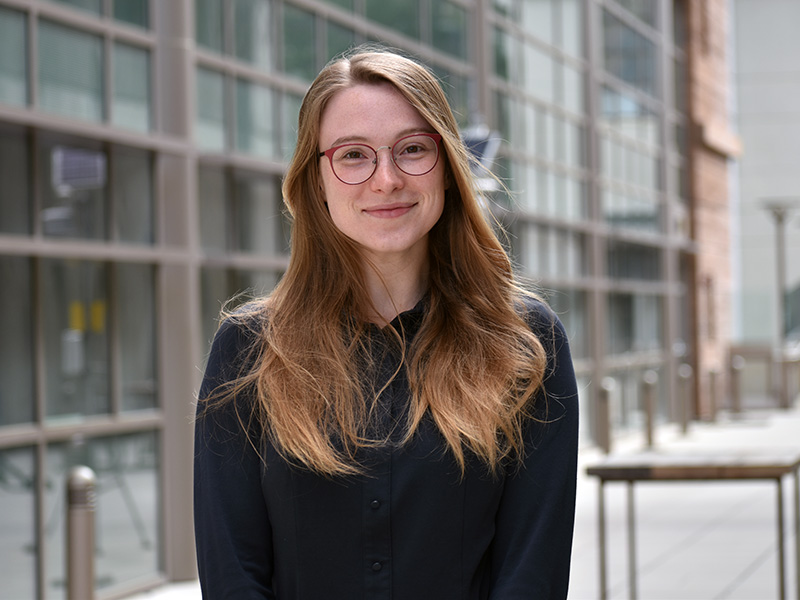
Sylvia Herbert, PhD
Sylvia Herbert, PhD (BSME '14, MS '14) was recently appointed an Assistant Professor and Primary Investigator in the Safe Autonomous Systems Lab at the University of California of San Diego, where she performs research on safety systems for robots and other autonomous systems. A Philadelphia native, Professor Herbert met with us to talk about her path and give some advice for other students interested in her field.
What led you to pursue a career in engineering research?
I was led to Mechanical Engineering largely because I liked my physics classes and participated in FIRST Robotics…. I did a co-op at Southco, which is an automotive latch company, and a couple co-ops in research, where I learned that I really enjoyed research. Oftentimes nothing worked and I was often frustrated, but I was constantly learning things and constantly being challenged and never bored.
I ended up doing graduate school at UC Berkley in Electrical Engineering and Computer Sciences and found myself in a controls group that does safety for autonomous systems, often applied to robotics. I found myself really taken with it because of the beauty and generality in the math of safety analysis that can be applied to systems varying from biology to self-driving cars to chemical reactors.
What made you choose Drexel?
I was very lucky in that my dad was a professor in psychology and Drexel has tuition remission, so a lot of it was the attraction of free tuition. I had also done a program organized by the College of Engineering wherein high school students could come stay in the dorms for three weeks to do research with faculty. I was in a biomedical lab where I helped clean failed hip and knee implants… it was a gnarly job with a lot of weird smells but I also learned a lot about biology. I really liked Drexel and really liked the staff in the Dean’s office. Like everyone says the co-op program was very appealing; it’s a huge advantage to have real work experience and know how to interview and work with a team. I think that even though I didn’t go into industry, those basic skills of interacting with people and having a boss helped in grad school and I think many students don’t get to have that kind of background.
How did your time at Drexel prepare you for a career in higher ed?
One part that helped with getting into a good grad program was the co-op, because I was able to do co-op in a research lab, and so that meant 6 months of focused research work which is something a lot of undergraduates don’t have. The fact that I was on one or two papers with grad students and that I had worked in a couple labs showed that I had the ability to do research. I was very involved in ASME and Pi Tau Sigma and so I had some leadership roles there, which has helped immensely in future positions. I got to sit on the MEM Undergraduate Curriculum Committee and participate in a few tenure reviews. I think it was a unique aspect about MEM that students got to see how a department functions by actively participating in these sorts of committees. This helped me know how to push for positive changes at my future department at UC Berkeley. Finally, courses like MEM 435 and Senior design required a lot of public speaking skills and I spoke at open houses which helped me learn how to disseminate the research I did in my PhD.
What advice would you give to students aspiring to a PhD in engineering?
Think about why you’re going to grad school. Don’t do it just because people told you you’re smart and have good grades. A lot of grad students are there because their professor told them they should think about it, but they get there, feel overwhelmed, and don’t enjoy it. Interest in your subject and in research in general is more important than your academic track record.
Seek lots of sources for advice and take that advice with a grain of salt. A frustrating amount of academia is not straightforward or clear. There’s a lot of lack of information and misinformation, and there’s a lot of knowing the right connections, so I would encourage people to seek advice and to stop being so scared to send an email to someone. A lot of the young students I talked to are very nervous about reaching out because they don’t want to annoy a professor or graduate student.
Be ok with feeling overwhelmed. I spend most of my days feeling overwhelmed. When I go to academic talks often I only understand a quarter of it and when I start a research project I usually feel overwhelmed about where to start. I think just recognizing the feeling of being overwhelmed and accepting it and continuing to move forward is something people don’t realize is happening all the time in academia anyways.
For more information about Professor Herbert's research or to contact about PhD and Postdoc inquiries, please visit sylviaherbert.com